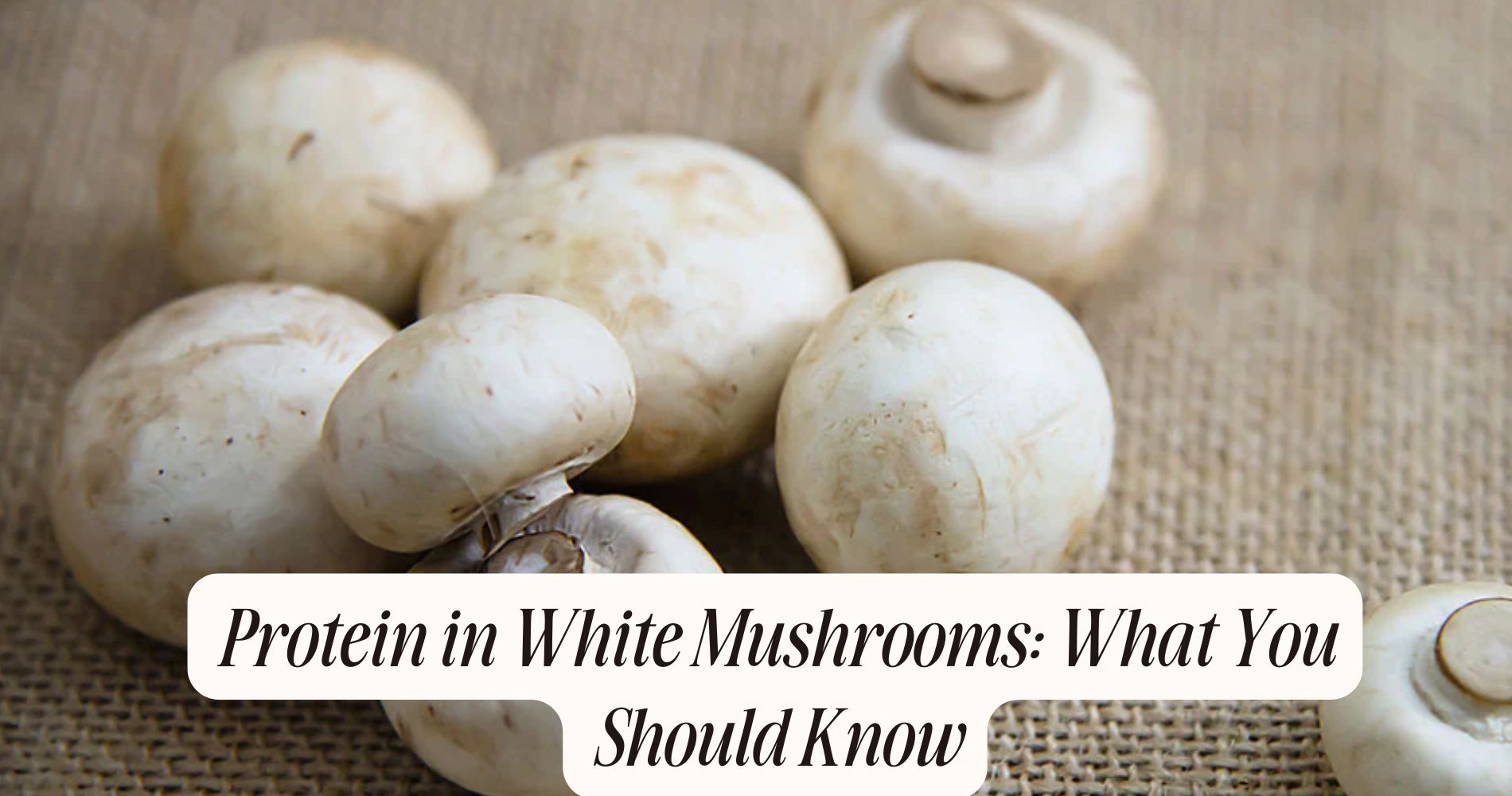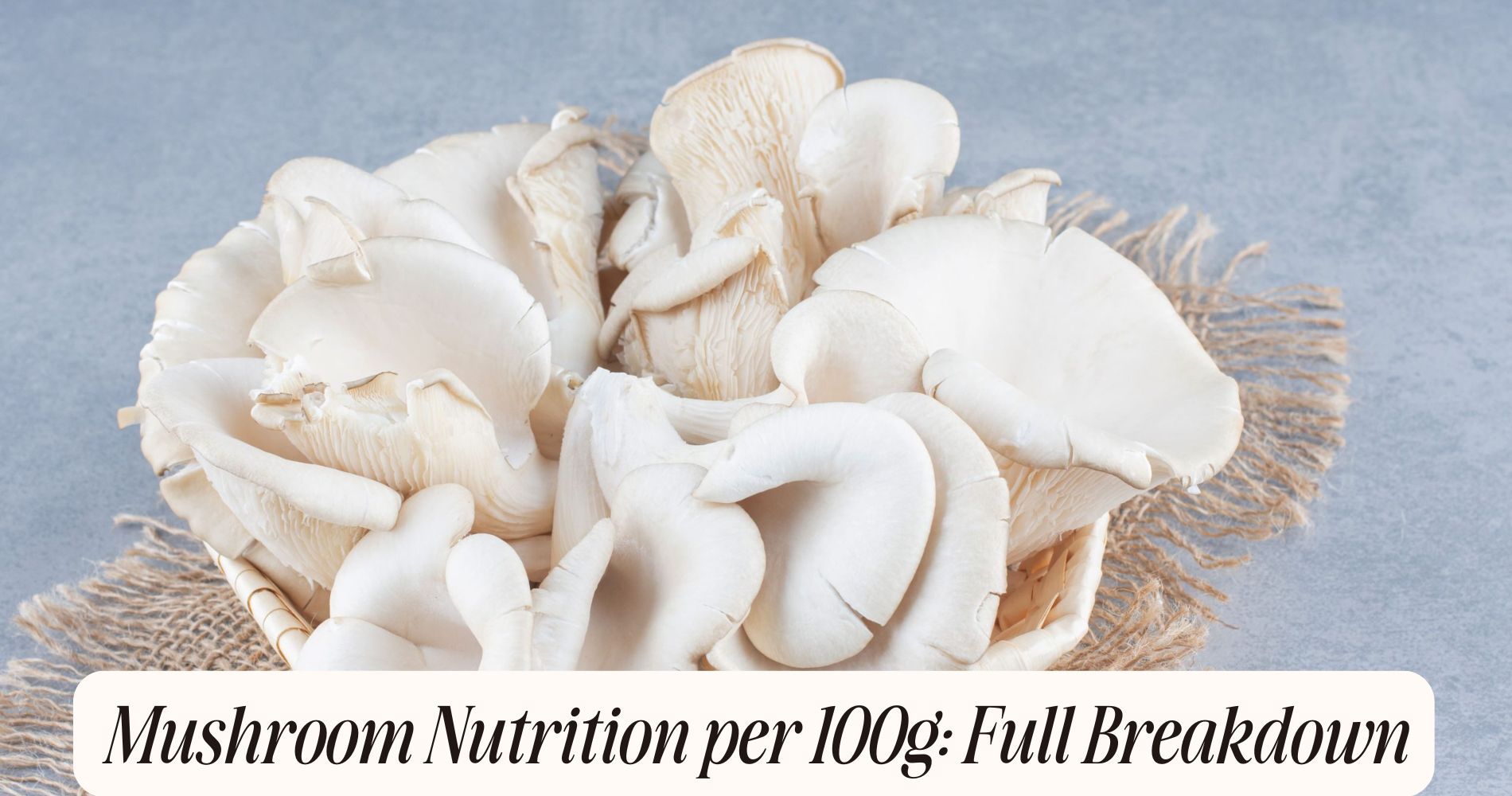
Protein in White Mushrooms: What You Should Know
Nutritional Profile of White Mushrooms
White mushrooms, also known as Agaricus bisporus, offer a rich nutritional profile that makes them a valuable addition to your diet. These mushrooms aren't only low in calories but also packed with essential nutrients. They provide a variety of vitamins, including B vitamins like riboflavin and niacin, which play a significant role in energy metabolism.
In addition to vitamins, white mushrooms are a source of dietary minerals such as selenium, potassium, and copper. These minerals are essential for maintaining optimal body functions, including immune support and heart health.

Compared to other mushroom varieties, white mushrooms are especially accessible and versatile, making them easy to incorporate into various dishes.
While they're not the highest protein sources compared to animal products, white mushrooms still contain a modest amount of protein, contributing to your overall intake. Including them in meals can help diversify your protein sources without excessive calories.
Protein Content Comparison
When comparing protein content among various foods, white mushrooms hold their own as a modest plant-based option. They offer about 3 grams of protein per 100 grams, which isn't as high as meat or legumes but still adds value to your diet. If you're exploring diverse protein sources, integrating white mushrooms can enhance both texture and nutrition in your meals.
For those with specific dietary preferences, like vegetarianism or veganism, white mushrooms can be particularly appealing. While they don't provide complete protein like animal products, they contribute essential amino acids. This makes them a great complement to other plant-based foods, boosting your overall protein intake when combined with grains or legumes.
When you consider protein-rich foods, mushrooms often get overlooked, but they're an excellent way to diversify your meals while keeping them low in calories. They also contain important nutrients like B vitamins and selenium, which support overall health.
Health Benefits of Protein
Consuming adequate protein is essential for muscle growth, helping you build and maintain strength.
It also plays a vital role in boosting your immune system, ensuring your body can fend off illnesses effectively.
Additionally, including protein in your diet can aid in weight management by promoting satiety and reducing cravings.
Muscle Growth Support
For those looking to enhance muscle growth, incorporating protein-rich foods like white mushrooms into your diet can be a game changer.
These mushrooms aren't only low in calories but also provide a decent amount of protein that supports muscle recovery. When you engage in resistance training or intense workouts, your muscles experience micro-tears that need repair, and protein plays an essential role in this process.
White mushrooms offer a plant-based protein source that's easy to integrate into meals. They contain essential amino acids, which are significant for building and repairing muscle tissue. Including these mushrooms in your diet can help you meet your daily protein needs, especially if you're following a vegetarian or vegan lifestyle.

Additionally, their high antioxidant content can aid in reducing inflammation, which is beneficial for muscle recovery after workouts.
By adding white mushrooms to your meals, you'll not only enjoy their unique flavor but also take a step closer to achieving your muscle growth goals.
Immune System Boost
Incorporating protein-rich foods like white mushrooms not only supports muscle growth but also plays a significant role in boosting your immune system. The protein found in these mushrooms helps enhance your immune response, enabling your body to fend off infections more effectively.
White mushrooms contain essential amino acids that contribute to the production of antibodies and immune cells. These proteins are essential for maintaining your body's defense mechanisms.
In addition, white mushrooms are rich in antioxidants, which help combat oxidative stress and inflammation. This antioxidant property is important for protecting your cells from damage and promoting overall health.
The beta-glucans in white mushrooms also stimulate the immune system, enhancing your body's ability to respond to pathogens. By including these mushrooms in your diet, you can support your immune system's functions, making you more resilient to illnesses.
Weight Management Aid
Harnessing the power of protein, white mushrooms can be a valuable ally in your weight management efforts. These fungi are low in caloric density, meaning you can enjoy a satisfying portion without consuming excess calories.
When you incorporate white mushrooms into your meals, their protein content contributes to a higher satiety factor, helping you feel fuller for longer periods. This can reduce the temptation to snack mindlessly between meals.
Research shows that protein plays a critical role in weight management by promoting muscle retention during weight loss and boosting your metabolism. By adding white mushrooms to your diet, you're not just getting protein but also essential nutrients that support overall health.
They're versatile, too—whether sautéed, grilled, or added to soups, white mushrooms can enhance the nutritional profile of your dishes.
Focusing on foods that offer high nutritional value with low calories sets you up for success. So, next time you're planning a meal, consider reaching for white mushrooms. They'll help you stay on track with your weight management goals while keeping your meals delicious and satisfying.
Cooking and Preparation Tips
White mushrooms bring a delightful umami flavor to your dishes, and knowing how to prepare them can elevate your cooking. Start by cleaning them gently with a damp cloth or a soft brush to remove any dirt. Avoid soaking them in water, as they can become soggy.
When it comes to cooking, mastering sautéing techniques is key. Heat a skillet over medium-high heat, add a bit of oil or butter, and let it get hot before adding the mushrooms. This helps achieve that perfect golden-brown color and enhances their flavor.
For ideal flavor pairings, consider combining white mushrooms with garlic, onions, or herbs like thyme and parsley. These ingredients complement the mushrooms' natural taste and add depth to your dish. Sauté them until they're tender and release their moisture, which usually takes about 5-7 minutes. If you're looking for a richer flavor, try adding a splash of white wine or soy sauce during cooking.
Experiment with different textures by grilling or roasting mushrooms as well. Each method brings out unique flavors, allowing you to enjoy white mushrooms in various ways. Don't hesitate to get creative and discover your favorite combinations!
Incorporating White Mushrooms Into Your Diet
Incorporating white mushrooms into your diet offers a range of nutritional benefits, including their high protein content and essential vitamins.
You can explore various cooking methods, from sautéing to grilling, to enhance their flavor and texture.
Plus, there are numerous recipe ideas that make it easy to enjoy white mushrooms in your meals.
Nutritional Benefits Overview
Adding white mushrooms to your diet can greatly enhance your nutritional intake. These mushrooms are low in calories but high in essential nutrients, making them an excellent choice for health-conscious eaters. They're a good source of protein, fiber, and various vitamins like B and D, which contribute to overall well-being.
One of the standout features of white mushrooms is their cooking versatility. You can include them in salads, stir-fries, soups, or even as a meat substitute in various dishes. This adaptability allows you to integrate them easily into your daily meals, regardless of your dietary preferences.

In addition to their nutritional benefits, white mushrooms provide a subtle flavor enhancement that can elevate any dish. Their earthy taste complements a wide range of ingredients, making them a perfect addition to both simple and complex recipes.
Cooking Methods Explained
When it comes to cooking with mushrooms, you'll find that they lend themselves well to a variety of methods that enhance their flavor and texture.
Sautéing techniques are particularly effective; simply cook them in a bit of oil over medium heat to bring out their rich, earthy taste. If you're looking for grilling options, try skewering them with vegetables for a smoky flavor that adds depth to any dish.
Roasting methods also work wonderfully, allowing the natural sugars to caramelize and intensify the taste. Steaming benefits include retaining nutrients while providing a tender bite.
For those craving a crispy texture, frying tips like using a light coating of flour can make your mushrooms delightful. Baking ideas include adding them to casseroles or stuffed dishes, while stir frying styles work well for quick meals packed with flavors.
Recipe Ideas Shared
White mushrooms can elevate a wide range of dishes, making them a fantastic ingredient to include in your meals. One delicious way to enjoy them is by preparing stuffed mushrooms. Simply remove the stems, mix them with breadcrumbs, garlic, herbs, and cheese, then bake until golden. This makes for a savory appetizer or side dish that's sure to impress your guests.
Another great option is mushroom risotto. Start by sautéing chopped onions and garlic in olive oil, then add Arborio rice, stirring until it's slightly translucent. Gradually incorporate vegetable broth while continuously stirring. When the rice is almost cooked, fold in chopped white mushrooms and let them soften. Finish with Parmesan cheese and a sprinkle of fresh parsley for a creamy, comforting dish that highlights the earthy flavor of the mushrooms.
Incorporating white mushrooms into your diet not only enhances taste but also boosts protein intake. These versatile fungi can be used in various recipes, from soups to salads, and even stir-fries.
Myths About Mushroom Protein
Many people mistakenly believe that mushrooms, including white mushrooms, don't provide significant protein compared to other food sources. This is one of the common mushroom misconceptions.
In reality, white mushrooms contain about 3 grams of protein per 100 grams, which, while not as high as meat or legumes, contributes to your daily intake, especially when combined with other protein sources.

Another protein myth is that mushrooms lack essential amino acids. While it's true that mushrooms aren't a complete protein like eggs or meat, they still provide a good balance of amino acids.
Incorporating mushrooms into your meals can enhance the overall protein profile of your diet.
Some might also claim that mushrooms are low in nutritional value. However, white mushrooms are rich in vitamins and minerals, including B vitamins, selenium, and potassium, which support overall health.
Enjoy Mushroom Benefits Anytime with Well Gummies SUPER MUSHROOM GUMMIES
While understanding the protein in white mushrooms is essential for a balanced diet, Well Gummies SUPER MUSHROOM GUMMIES make it even easier to harness the benefits of mushrooms. Packed with ten functional mushrooms, these vegan gummies provide natural energy, improved focus, and immune support in a convenient gum chew form.
With a delightful wild berry flavor, they’re as enjoyable as candy and perfect for incorporating mushroom power into your daily routine—no cooking required. Feel energized and balanced with Well Gummies today!
Frequently Asked Questions
Are White Mushrooms a Complete Protein Source?
White mushrooms aren't a complete protein source, but they offer nutritional benefits. They contain essential amino acids, aiding protein absorption when combined with other foods. Incorporating them into meals enhances your overall protein intake effectively.
How Do White Mushrooms Compare to Meat Protein?
When you compare white mushrooms to meat protein, you'll find that mushrooms offer lower protein levels but provide unique mushroom nutrition benefits. Their protein absorption efficiency varies, making them a complementary option rather than a direct substitute.
Can I Get Enough Protein From White Mushrooms Alone?
You can't rely on white mushrooms alone for sufficient protein. While they contribute to protein absorption, a dietary balance including various protein sources is essential for ideal nutrition and meeting your body's needs effectively.
What Are the Best Mushroom Varieties for Protein?
When considering mushroom nutrition, shiitake and maitake varieties stand out as better protein sources. They offer higher protein content compared to common white mushrooms, making them a great addition to your diet for enhanced nutrition.
Are There Any Allergens Related to Mushroom Protein?
Yes, some people have mushroom allergies that can cause reactions when consuming mushrooms. Additionally, protein sensitivity may occur in certain individuals, leading to digestive issues. Always consult a healthcare professional if you suspect allergies or sensitivities.
Conclusion
Incorporating white mushrooms into your diet can boost your protein intake while providing essential nutrients. With about 3 grams of protein per 100 grams, they're a great addition to various dishes. Remember, they're not a substitute for animal proteins but can complement a balanced diet. By dispelling myths and understanding their benefits, you can enjoy white mushrooms as a versatile and healthy ingredient in your meals. So, get creative and add them to your favorite recipes!




